Initiatives for Effective Use of Resources Back Number (2017)
Back to Latest Initiatives for Effective Use of Resources
Basic Approach
The MinebeaMitsumi Group recognizes that there are limits to the availability of resources used in its products, which include metals, plastics, and other raw materials, along with oil, natural gas, and other energy sources. Additionally, with regard to rare earth elements indispensable to the manufacture of electronics, since the number of countries producing and exporting the materials is limited, they are more susceptible to export restrictions.
We believe that the effective use of resources is critical to the continuation of our business activities, and to that end we are taking various measures.
Results of FY2016 Initiatives
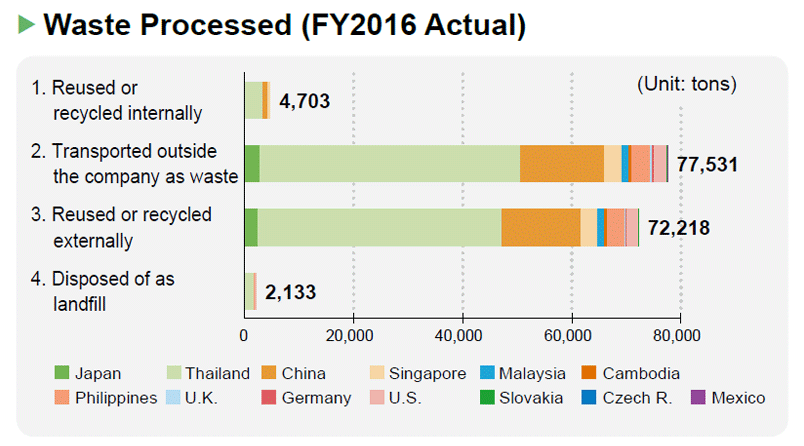 In FY2016, principal raw materials used by the MinebeaMitsumi Group included 95,800 tons of steel and 16,100 tons of resin, and the total amount of materials used increased about 12% compared with FY2015.
In FY2016, principal raw materials used by the MinebeaMitsumi Group included 95,800 tons of steel and 16,100 tons of resin, and the total amount of materials used increased about 12% compared with FY2015.
The amount of landfill waste generated by the Group's operations in FY2016 totaled 2,133 tons, an increase of 193 tons compared to FY2015.
At our mass production plants in Thailand and China, we are recycling water inside the plants to the greatest extent possible and prevent external emissions through our "Plant Wastewater Zero System." Water emissions from Group plants in FY2016 totaled 3,425,000 m3, an increase of 339,000 m3 compared with FY2015.

Initiatives at Business Sites
Effective Use of Rain and River Water (Thailand)
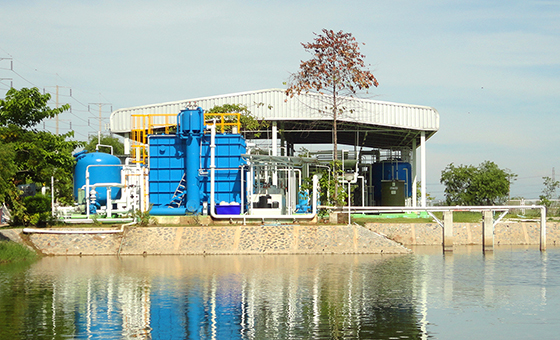
Bang Pa-in Plant’s rainwater reservoir and rainwater reuse facility
In Thailand, our plants collect rainwater in a reservoir on the plant grounds and purify it at rainwater reuse facilities for reuse as industrial water, thereby reducing the amount of tap water used.
In addition to this system, one of the Thai plants took further steps in FY2012 to substantially reduce tap water consumption by drawing water from the nearby Chiang Rak Noi Canal and purifying it to use as an alternative to tap water. With the start of this system, the plant has reduced both its tap water consumption and its water related costs.
Conversion of Raw Food Waste into Biogas (Thailand)
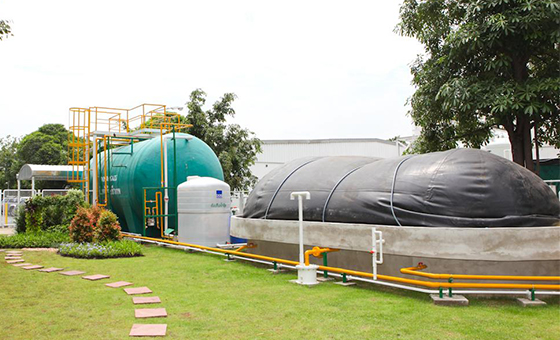
Biogas generation equipment
NMB-Minebea Thai is taking part in a project by the Thai Ministry of Energy to promote the recycling of raw food waste into biogas energy. Both the Bang Pa-in and the Lop Buri plants have installed biogas generation systems on site. The generated biogas from the plants boasts a low environmental footprint, and is used as an alternative to LP gas for cooking meals in the cafeterias.
Recycling of packing case materials (domestic logistics warehouse)
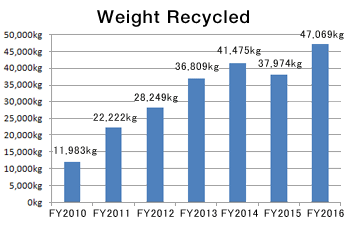
Since FY2010, the MinebeaMitsumi Group has sold as recyclable materials the polyethylene product containers (vials), stretch films, and polypropylene bands used in product deliveries to customers.
In FY2016, about 47 tons of vials, stretch films, and polypropylene bands were reprocessed into resin pellets and then recycled into planters and flower pots, as well as imitation trees.
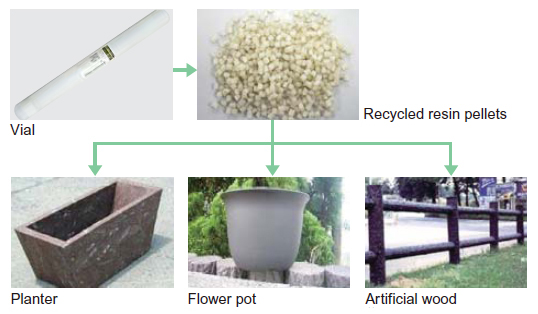
Future Issues and Goals
For FY2017, the Group’s goal is to reduce the amount of waste sent to landfill by 6% per basic unit of production compared with FY2015.
In addition, we are presently conducting a survey of the current situation, and market analysis, of waste products disposed of in landfill with the aim of achieving still further reductions in the future.














